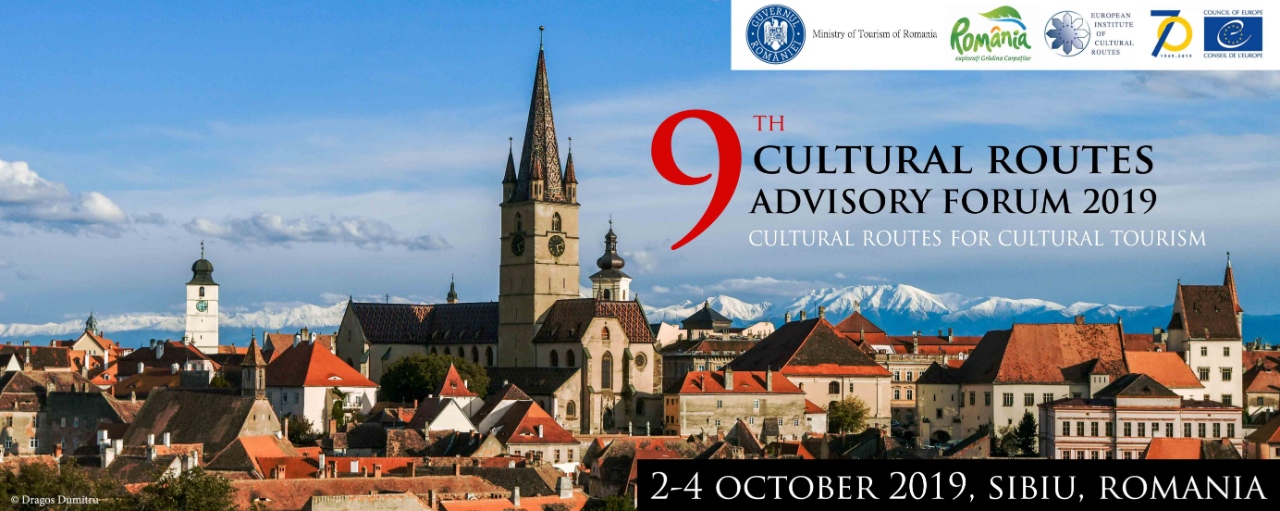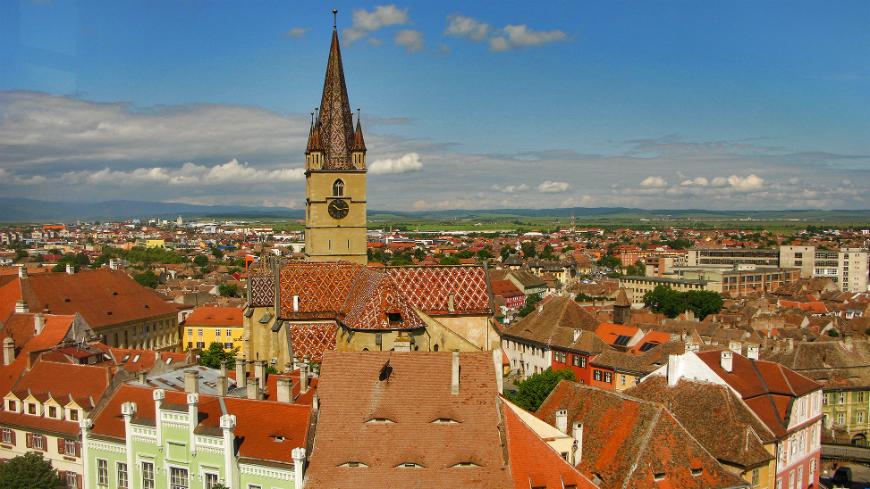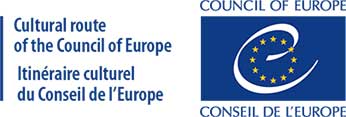
Declaration
of the 9th Annual Advisory Forum on Cultural Routes
Sibiu, Romania, 2-4 October 2019
Cultural Routes FOR Cultural Tourism
Following the Council of Europe Cultural Routes Annual Advisory Forum, 2-4 October 2019, Sibiu, Romania;
With thanks to the Ministry of Tourism of Romania and the authorities of the City of Sibiu for hosting the 9th Annual Advisory Forum on the Cultural Routes of the Council of Europe and thanking the 33 EPA Member States for their continued support for the Cultural Routes of the Council of Europe programme, the 38 certified Cultural Routes of the Council of Europe for the excellence of their work, and thanking also the Grand Duchy of Luxembourg for its continued support for the programme through the hosting of the European Institute of Cultural Routes (EICR);
Welcoming the attendance of honoured speakers and delegates representing the Cultural Routes of the Council of Europe, the members and observers of the Enlarged Partial Agreement (EPA) and its Board, representatives from international, European and national organisations including EU/EEAS, UNESCO, UNWTO, ETC, NEMO, OIE, ICOMOS and across the public and private sectors engaged in cultural tourism;
Recognising previous discussions and actions emanating from previous Advisory Forums and the on-going actions and initiatives of the Cultural Routes of the Council of Europe in the broad field of sustainable cultural tourism;
Taking note of the Cultural Routes and Cultural Tourism independent expert report as discussed by EPA members at the occasion their meeting of 2 October during the Forum, and in particular regarding the suggestion for strengthened cooperation between Ministries of Culture and Ministries of Tourism through structured coordination and / or ad hoc cooperation, and by creating synergies by strengthening cooperation between all public and private actors (national and local) and associations of Tourism and Culture;
Observing that cultural tourists are acknowledged as a significant and growing sector for Europe, for member states, for urban and rural areas and the variety of their constituents of cultural heritage sites and attractions that are both tangible and intangible in nature;
Acknowledging that cultural tourism can be a vital mechanism for local economic and social development, particularly in less-known regions of Europe;
Noting that as with any form of tourism, cultural tourism needs to be managed so as to prevent and mitigate any negative impacts upon the environment, host communities and cultures;
Being aware of the actual and potential role and contribution of the Cultural Routes of the Council of Europe in developing cultural tourism products and activities;
This Declaration recognises that:
The Cultural Routes Programme, launched by the Council of Europe in 1987, provides a framework for the development of thematic routes that demonstrate how the heritage of the different countries and cultures of Europe can contribute to a shared cultural heritage;
The Cultural Routes embody the fundamental principles of the Council of Europe: human rights, cultural democracy, cultural diversity and identity, dialogue, mutual exchange and enrichment across boundaries and centuries;
The Enlarged Partial Agreement on Cultural Routes of the Council of Europe (EPA), established in 2010 (Resolution CM/Res(2010)53), enables closer co-operation between states particularly interested in the development of Cultural Routes and reinforces the potential of Cultural Routes for their cultural co-operation, sustainable territorial development and social cohesion, with a particular focus on themes of symbolic importance for European unity, history, culture and values and the discovery of less well-known destinations;
Tourism is an important dimension of the Cultural Routes Programme and the Cultural Routes of the Council of Europe are required to meet eligibility and certification criteria through the “development of initiatives and exemplary and innovative projects in the field of cultural tourism and sustainable cultural development” and the themes of the Routes must also lend themselves to the “to the development of tourist products in partnership with tourist agencies and operators aimed at different publics, including school groups” (Resolution CM/Res(2013)67).
Specifically, cultural tourism and sustainable cultural development is a priority field of action for the Cultural Routes of the Council of Europe through which they must:
- Take account of local, regional, national and European identities;
- Actively involve print and broadcast media and make full use of the potential of electronic media in order to raise awareness of the cultural objectives of Route activities;
- Promote dialogue between urban and rural cultures, between regions in the south, north, east and west of Europe, and between developed and disadvantaged regions;
- Promote dialogue and understanding between majority and minority, native and immigrant cultures;
- Open up possibilities for co-operation between Europe and other continents through the special affinities between certain regions;
- Concern themselves, in the field of cultural tourism, with raising public awareness, drawing decision makers' attention to the necessity of protecting heritage as part of sustainable development of the territory and seek to diversify both supply and demand, with a view to fostering the development of quality tourism with a European dimension;
- Seek partnerships with public and private organisations active in the field of tourism in order to develop tourist products and tools targeting all potential publics.
Cultural tourism is thus a central concern for the Cultural Routes of the Council of Europe; a concern that not only acts to propel the sustainable development of communities and regions across Europe but that also acts to promote cross-cultural understanding, inter-cultural dialogue and the development of partnerships and collaboration.
Thus, following the occasion of the Council of Europe Cultural Routes Annual Advisory Forum, 2-4 October 2019, Sibiu, Romania, this Declaration reaffirms and proposes that:
- Cultural tourism remains a priority development area for the Council of Europe Cultural Routes Programme;
- Cultural tourism allows for synergies to be developed both within and between existing Cultural Routes of the Council of Europe, so as to increase opportunities for tourists to experience the diversity of tangible and intangible heritage of Europe;
- Cooperation is continued and extended between the Cultural Routes Programme and international bodies working in support of sustainable cultural tourism development, in particular the United Nations World Tourism Organisation (UNWTO), the World Heritage Sustainable Tourism Programme of UNESCO and the European Travel Commission;
- Cooperation is continued and enhanced between the Cultural Routes Programme and the European Union Institutions (European Commission, European Parliament, European External Action Services), regional and macro-regional organisations and networks of regions, associations and networks working in the interests of the cultural tourism sector across Europe, such as the Black Sea Economic Cooperation, and the Organisation of Ibero-American States;
- There is enhanced development of international linkages and overseas sector opportunities for the Cultural Routes of Europe through cultural tourism;
- Synergies between public and private sector tourism bodies are encouraged at national, regional and local levels for the benefit of the cultural producers, heritage managers, local communities, local economies and tourists associated with the Cultural Routes of the Council of Europe Programme;
- The profile of the Council of Europe Cultural Routes Programme is enhanced through collective awareness raising and effective branding so as to support cultural tourism development activity by the Cultural Routes;
- Training and continued professional development opportunities for Route managers and members be enlarged through the European Institute of Cultural Routes, the annual Training Academy and tailored workshops in the field of cultural tourism so as to facilitate the development of high-quality cultural tourism provision;
- That research into cultural tourism development opportunities through the Cultural Routes be encouraged and undertaken through the Cultural Routes of the Council of Europe University Network, the Scientific Committees of the Cultural Routes and their local partnerships with education institutions;
- Full use is made of European funding programmes for research and exchange appertaining to cultural tourism development and research;
- Cultural tourism is addressed through its relationships to other themes relevant to the sustainable development of the Cultural Routes and discussed in future Advisory Forums, training programmes, workshops and conferences;
The Cultural Routes of the Council of Europe make full reference to this Declaration and make it available through their websites and related social media so as to promote the value of cultural tourism and its development to all stakeholder.
*This Declaration is not legally binding

Muzeul Astra
Strada Pădurea Dumbrava, nr.16-20
550182 Sibiu (ROMANIA)
Casa de Cultură Cisnădie
Strada Sibiului, nr.1
555300 Cisnădie (ROMANIA)

© Ministry of Tourism



